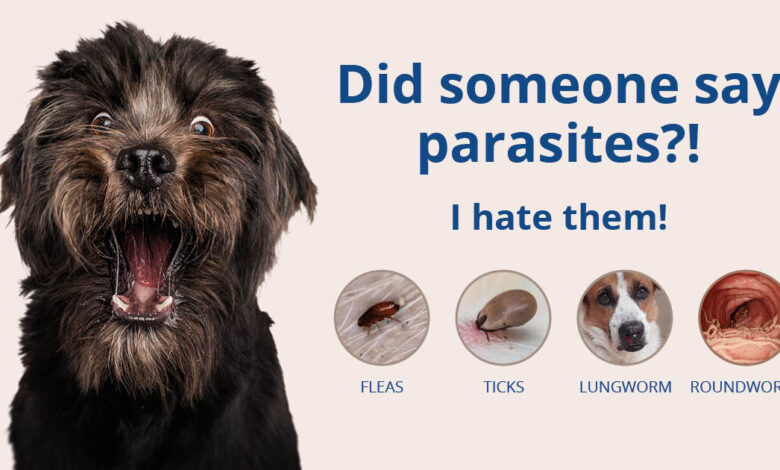
Parasites such as fleas and ticks can be very damaging to your pet’s health. Preventive measures should be taken year-round to inhibit potential outbreaks.
Revised Version (Concise):
Parasites like fleas and ticks can seriously harm your pet’s health, so year-round prevention is essential to avoid infestations and related diseases.
Optional Expanded Version
Fleas, ticks, and other parasites can cause significant health problems for your pet, ranging from skin irritation to the transmission of serious diseases. To protect your pet, it’s important to implement preventive measures all year long—regardless of the season—to reduce the risk of infestations and maintain their well-being.
Why are parasites dangerous?
Fleas:
Fleas are small, wingless, brown, fast moving insects you can see in your pet’s fur. Some animals are allergic to the saliva of fleas, which can cause inflammation and more discomfort. If ingested while your pet is grooming themselves, fleas can transmit an intestinal parasite called tapeworm. Flea infestations can lead to anemia and fleas are also capable of transmitting serious diseases.
Ticks:
Ticks are members of the spider family and live in cracks and crevices in the home or outside in vegetation such as grassy meadows, woods, brush, and weeds. Some tick bites only cause mild irritation or swelling at the site, but other tick bites can infect your pet with serious illnesses. If left untreated, these diseases, such as lyme, can lead to more severe health problems or even be fatal.

Note: If you see a tick and cannot remove it, we will gladly help you. Call us immediately to limit the impact of the tick’s attachment. It’s much safer to have one of our trained professionals remove the tick for you. Make an appointment with us immediately to limit the impact of the tick.
Pet parasites
Which parasites you have to worry about depends greatly on your pet’s lifestyle and where you live. For instance, a Persian cat in a New York City apartment has much less parasite concern than an adventurous, ever-hungry Labrador in Louisiana. Ultimately, what type of parasite control you do for your pet should be discussed with your veterinarian, who can tailor a program that fits your pet’s needs, your personal belief system and the particular parasites present in your area or places where you travel with your pet.

When we thinking about parasite control. While this discussion is broken down into three major categories of parasites — ectoparasites, intestinal parasites and heartworm — there are certainly other categories. However, those tend to be less common or specific to certain geographic region.
Ectoparasites
Ectoparasites are the ones you can see, such as fleas, ticks and mosquitoes, so they can have a significant “ick” factor. These types of parasites not only cause discomfort in the form of itchiness and pain, they can also transmit some very serious diseases, like mycoplasma haemophilus (from fleas), Lyme disease and Rocky Mountain spotted fever (from ticks), and heartworm disease (from mosquitoes).
Intestinal parasites
Intestinal parasites can cause diarrhea, a poor hair coat (due to not absorbing nutrients), weight loss, vomiting and loss of appetite. The most common intestinal parasites are roundworms, hookworms and whipworms. Tapeworms are also very common — not to mention very gross — but they tend not to cause problems in dogs and cats.
What Is Heartworm Disease in Dogs?
Heartworm Disease:
Heartworms are transmitted when an infected mosquito bites your pet. Heartworms are parasites that live in the heart and its surrounding blood vessels. The adult heartworm produces offspring called microfilariae, which circulate in the pet’s blood. Unrecognized and untreated heartworm infections can be fatal.

Heartworm disease in dogs is caused by the parasite Dirofilaria immitis. It causes heartworm disease not only in dogs, but also in cats ferrets, and other mammals.
Heartworm is a large worm, reaching up to a foot or more in length. As it completes its life cycle—which takes about six to seven months—it ends up in an animal’s heart and pulmonary vessels, where it can live for several years.
Heartworm disease is a serious and potentially fatal illness in dogs caused by parasitic worms called Dirofilaria immitis. These worms, transmitted through mosquito bites, primarily reside in the heart, lungs, and associated blood vessels of infected dogs. While treatable, heartworm disease can lead to severe lung disease, heart failure, and other organ damage.
- Cause:
- The disease is caused by the parasitic worm, Dirofilaria immitis, which is transmitted by mosquitoes.
- Transmission:
- When a mosquito bites an infected animal (dog, cat, or other mammal), it ingests microscopic heartworm larvae (microfilariae). These larvae develop further in the mosquito and are then transmitted to a new host when the mosquito bites again.
- Progression:
- The larvae migrate through the dog’s body until they reach the heart, lungs, and blood vessels, where they mature into adult worms. Adult heartworms can grow to be 6-14 inches long and can live for 5-7 years in dogs.
- Effects:
- The presence of adult heartworms in the heart and lungs can cause significant damage, including inflammation, blood vessel damage, and reduced blood flow. In severe cases, this can lead to heart failure, lung disease, and damage to other organs like the liver and kidneys.
- Symptoms:
- Early stages of heartworm disease may not show any symptoms. As the disease progresses, symptoms can include coughing, lethargy, exercise intolerance, and difficulty breathing. Advanced cases may involve fainting, fluid buildup in the abdomen, and other severe complications.
- Treatment:
- Heartworm disease is treatable, but the treatment can be lengthy and expensive. It typically involves a series of injections to kill the adult worms, followed by a period of rest and monitoring.
- Prevention:
- Heartworm disease is highly preventable through the use of monthly heartworm preventative medication, which are available as chewable tablets, topical solutions, or injections.
Summary for Parasite Control (Fleas, Ticks & Heartworms):
Parasite Control: Fleas, Ticks & Heartworms
1. Fleas
- Impact: Cause itching, allergic reactions, skin infections, and can transmit tapeworms.
- Prevention: Monthly topical/oral treatments, regular grooming, and environmental control (vacuuming, washing bedding).
- Treatment: Use vet-approved flea control products; treat both the animal and its environment.
2. Ticks
- Impact: Transmit serious diseases like Lyme disease, ehrlichiosis, and anaplasmosis.
- Prevention: Avoid tick-infested areas, use tick preventatives (spot-on, collars, oral meds), and perform daily checks after outdoor activities.
- Removal: Use tweezers to carefully remove ticks; avoid crushing.
3. Heartworms
- Impact:
- Spread by mosquitoes; live in the heart and lungs, causing severe damage or death—especially in dogs.
- Prevention:
- Year-round monthly heartworm preventatives (oral or injectable).
- Detection:
- Annual blood tests; early detection is critical.
- Treatment:
- Lengthy and expensive; prevention is far safer and more effective.
Parasite Control – Quick FAQs
Q: Do indoor pets need parasite prevention?
A: Yes, fleas, ticks, and mosquitoes can enter your home.
Q: How often should I give parasite preventatives?
A: Most are monthly; some heartworm shots last 6–12 months.
Q: Can fleas and ticks make my pet sick?
A: Yes, they can cause skin issues and transmit diseases.
Q: How are heartworms spread?
A: Through mosquito bites.
Q: Is parasite prevention necessary year-round?
A: Absolutely—especially in warm or humid climates.
Q: What if my pet already has fleas or ticks?
A: Use vet-approved treatments and treat the environment too.
Q: Is heartworm treatment expensive?
A: Yes. Prevention is much safer and cheaper.
Need Veterinary Help?
If you have questions about animal health, management, diseases, or treatment, our professional veterinary team is here to help.
Consult Online: Contact Us
Email: professionaldvm129@gmail.com
Website: www.veterinaryhub.info







nhva7t
fj9jcz